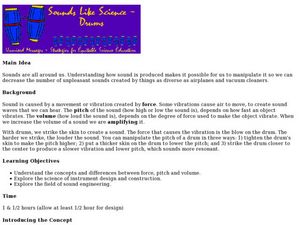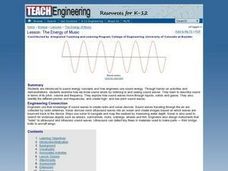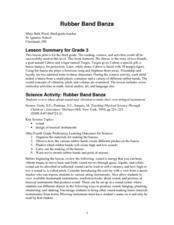Curated OER
Musical Instruments - Woodwinds
Students assemble and examine typical European orchestral woodwind instruments, determine how the instruments change pitch, identify common orchestral woodwind instruments by sound, and research a non-Euro-centric woodwind instrument in...
Curated OER
Sounds Like Science - Drums
Students see that understanding how sound is produced makes it possible for us to manipulate it so we can decrease the number of unpleasant sounds we encounter. They make a drum to explore the concepts of force, pitch and volume.
Curated OER
Sounds Like Science: Drums
Students explore the science of sound. In this sound lesson, students craft drums from various materials and respond to questions regarding pitch, force, and volume.
Curated OER
The Energy of Music
Students discover how engineers use sound energy. They participate in hands-on activities in which they discover how we know sound exists. They identify different pitches and frequencies as well.
Curated OER
Sounds Like Science-Guitars
Students demonstrate the relationship between a sound and its frequency. In this sound and frequency activity, students use an old tennis racket and nylon fishing line to create a guitar. Students observe the pitch and frequency.
Curated OER
Elements of Music
In this music worksheet, students study the elements of a musical composition: silence, pitch, texture, dynamics, tempo, attack and decay and duration. Students complete 7 questions about these elements. Prior knowledge is assumed.
Curated OER
Elements of Music
In this music worksheet, students learn 6 elements of music and match the names with the definitions. The elements are silence, pitch, texture, duration, dynamics, tempo and attack and decay.
Curated OER
Elements of Music
In this elements of music worksheet, students review the terms: silence, attack and decay, dynamics, pitch, duration, tempo, and texture as they fill in the blanks with the terms in 7 sentences. In addition, students complete 1...
Curated OER
Sound and Hearing
In this sounds worksheet, students will review how sound is created by vibrations. Students will understand what creates vibrations and how the ear receives those sound waves. This worksheet has 10 fill in the blank, 9 multiple choice, 1...
Curated OER
2nd Grade Physical Sciences
Second graders complete activities to measure motion and learn about the Earth's history. For this motion and Earth history lesson, 2nd graders discuss sound and complete a matching sound activity. Students then study the history of...
Curated OER
Literature Soundtracks
Student choose ten songs to create a soundtrack for a novel read in class or as outside reading. In the liner notes, instead of lyrics Students writes a rationale of why or how the song relates to the novel in terms of setting,...
Curated OER
Human Parts
Very young learners who are studying the human body will use this worksheet to identify certain body parts. A cartoon drawing of a boy is shown, and learners must draw lines matching up words such as arm, tummy, foot, and toes to the...
Curated OER
Funny Ears
Young scientists get a activity that has a picture of a dog, a donkey, a person, a mouse, a rabbit, and a cat. Each picture has the wrong ears attached to it! Learners must draw lines matching up the ears with the correct recipient. The...
Curated OER
Plant Parts
Little ones identify the parts of a plant and practice following directions at the same time. They color each part of the flowering plant the color indicated on the sheet. Roots are brown, leaves are green, the flower is red, and the...
Music Fun
Instruments to Trace Color and Label
Handbells and castanets. Triangles and timpani. Trumpets and trombones. As part of their study of instruments, young musicians label, trace and color the parts of seven instruments. Also included in the resource packet are tracing...
Mr. E. Science
Sound
Since light travels faster than sound, some people may appear bright until you hear them speak. The presentation covers what sound is, how fast it travels in various mediums, properties of sound, hearing, and the parts of the human ear.
Curated OER
Clerihew Dances II
Third graders explore rhythm and quality of word and phrased to that of dance. They move to the rhythm of poetry.
Curated OER
The Five Senses
Students recognize how each of the five senses works and define the related terminology. They compare and contrast the means by which the senses gather information about the world. In addition, they research how an assigned sense works...
Curated OER
Music and Emotion
Students identify the various emotions created by different types of music. They Identify role of music in creating various emotions for film and television . They observe and practice various ways of playing percussion instruments. They...
Computer Science Unplugged
Codes in a Song—Modems
Let's listen to some codes. To understand how a modem sends binary numbers over a phone line, class member listen to the codes included in the provided mp3 files, translates the tones to binary numbers and then convert the binary numbers...
Curated OER
Being Shadowed
What causes a shadow to appear? Have kindergartners and first graders explore shadows with a fun science activity. After reading a short paragraph about light sources, they draw a shadow for a little girl based on the location of the...
Curated OER
Rubber Band Banza
Third graders review ideas about sound and vibration to make their own stringed instrument. They review what a pictograph and bar graph are. Pupils conduct a survey within the classroom to choose the four favorite string instruments and...
Curated OER
Express Yourself
Reading with expression excites listeners of any age. They will discuss different ways to change their reading expression as they listen to the teacher read Froggy Goes to the Doctor. Then in small groups, they'll practice reading with...

























